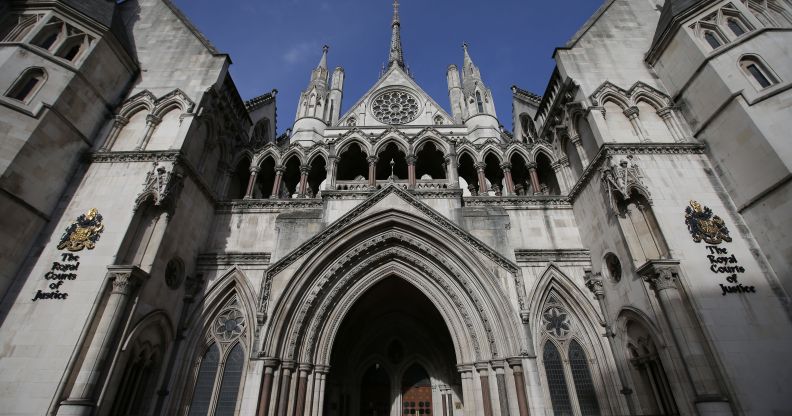Stonewall urges court to let it ‘speak for trans kids’ in NHS appeal against puberty blockers ruling

The Royal Courts of Justice, which house the High Court of England and Wales, where the judicial review was heard. (DANIEL LEAL-OLIVAS/AFP/Getty Images)
A coalition of pro-trans groups has applied to intervene in the NHS appeal against the High Court’s ruling on puberty blockers.
The intervention by LGBT+ rights charity Stonewall, national trans-led charity Gendered Intelligence, young people’s sexual health charity Brook and the Endocrine Society, the world’s largest organisation dedicated to hormone health, was filed Tuesday (26 January).
They say they want to “speak for the voices that were not directly heard in the original court judgment, in particular the voice of the child”.
In December, the High Court published its verdict in a landmark judicial review against GIDS, the only NHS gender clinic for trans youth in England and Wales, saying it’s “doubtful” transgender under-16s can give informed consent to puberty blockers, and as a result will need to pursue a court order for the treatment.
The High Court’s judgement is suspended pending the outcome of the Tavistock and Portman NHS Trust’s appeal, which was granted on 18 January.
There will now be a court hearing Friday (29 January) to decide if the intervention will be allowed.
Speaking about the intervention, Stonewall wrote on Twitter: “We are proud to stand up for trans young people and their families, and it’s vital that we all continue to do during this period of uncertainty.”
The intervention has “the backing of many other organisations in the LGBT, children’s rights, and reproductive rights sectors, alongside international medical bodies” and is supported by the Good Law Project, whose Legal Defence Fund for Transgender Lives has raised more than £130,000.
“The NGOs speak for the voices that were not directly heard in the original Court judgment, in particular the voice of the child and the voice of prescribing doctors with expertise in the medical evidence and standard of care for transgender health,” the Good Law Project said.
“It is based on three main grounds: (i) the need to hear the voice of teenagers affected, (ii) the issues the judgment raises around the role of parental consent and, (iii) the wider implications, in particular for access to contraception and abortion care, of the Divisional Court’s ruling.
“The interveners have closely coordinated and formed a wider coalition across their sectors to ensure that all the affected groups are represented and that the relevant evidence and expertise are before the court, without duplication.”
The High Court case was brought by Keira Bell, 23, who took puberty blockers at 16 and had top surgery at 20 but has since detransitioned, and Mrs A, who is trying to prevent her 16-year-old child taking puberty blockers. It hinged on whether under-16s can give informed consent to puberty blockers, which are currently the only medication available to gender dysphoric under-16s.
Puberty blockers are widely deemed safe, reversible and medically necessary, lawyers for the Tavistock maintained at the October hearing. Lawyers for Bell and Mrs A argued that trans teens should have to go before a court before being able to access the medication.
The High Court agreed, with the judges saying in their ruling that it is “doubtful” children aged 14 to 15 could understand “the long-term risks and consequences” of taking puberty blockers and then HRT, and “highly unlikely” that children under 13 would be competent to give consent.
As a result, the court said clinicians may “regard these as cases where the authorisation of the court should be sought prior to commencing the clinical treatment”. The judges ruled that informed consent for puberty blockers should be tied to an understanding of the long-term implications of taking HRT or having gender-affirming surgery later in life.
A spokesperson for the Tavistock and Portman NHS Trust said they “welcome” the court’s decision to allow their appeal, which must be heard before 22 March, 2022, against the ruling.
“Our priority is to work together with our partners to support our patients and their families while legal proceedings are ongoing,” the spokesperson said.

